

Occupy Wall Street's Battle Against American-Style Authoritarianism. The Occupy Wall Street movement is raising new questions about an emerging form of authoritarianism in the United States, one that threatens the collective survival of vast numbers of people, not through overt physical injury or worse, but through an aggressive assault on social provisions that millions of Americans depend on.

For those pondering the meaning of the pedagogical and political challenges being addressed by the protesters, it might be wise to revisit a classic essay by German sociologist and philosopher Theodor Adorno titled "Education After Auschwitz," in which he tries to grapple with the relationship between education and morality in light of the horrors perpetrated in the name of authoritarianism and its industrialization of death.[1] To see other articles by Henry A.
Giroux visit The Public Intellectual Project. Democracy is always an unfinished project. Yet, in its current state in America, it appears to be terminal decay. 1. 2. 3. 4. 5. 6. 7. The Fight for 'Real Democracy' at the Heart of Occupy Wall Street. Demonstrations under the banner of Occupy Wall Street resonate with so many people not only because they give voice to a widespread sense of economic injustice but also, and perhaps more important, because they express political grievances and aspirations.
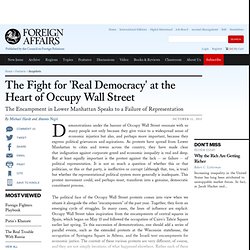
As protests have spread from Lower Manhattan to cities and towns across the country, they have made clear that indignation against corporate greed and economic inequality is real and deep. But at least equally important is the protest against the lack -- or failure -- of political representation. It is not so much a question of whether this or that politician, or this or that party, is ineffective or corrupt (although that, too, is true) but whether the representational political system more generally is inadequate. Occupy May Seem To Be Receding, But Look Closer. Hide captionOccupy Wall Street protesters shout during a "Shut Down the Corporations" demonstration in New York on Wednesday.
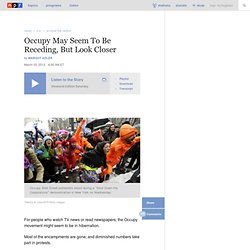
Timothy A. Clary/AFP/Getty Images Occupy Wall Street protesters shout during a "Shut Down the Corporations" demonstration in New York on Wednesday. For people who watch TV news or read newspapers, the Occupy movement might seem to be in hibernation. Most of the encampments are gone, and diminished numbers take part in protests. Less Visible Occupy Movement Looks for Staying Power. Why Occupy failed. The Occupiers’ disdain for everyday democracy brings them dangerously close to their neoliberal foes.
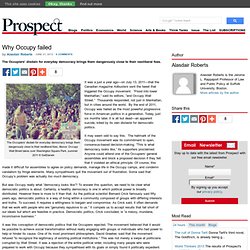
The Occupiers' disdain for everyday democracy brings them dangerously close to their neoliberal foes. Above: Occupy Wall Street takes over Washington Square Park, summer 2011 © GetDarwin. Occupy Wall Street—Where Are They Now? Josh Harkinson It was one year ago today that the pioneers of Occupy Wall Street first unrolled their sleeping bags in Zuccotti Park.

Though the movement is long gone from the headlines, it can be credited for calling BS on our money-driven political system and launching a national conversation about class and economic inequality—one that still looms large in the presidential campaign. I showed up at the Zuccotti Park encampment in its second week for what I thought would be just a day, but I ended up reporting on the movement from New York City all through the fall and beyond. What most fascinated me were the occupiers themselves, people alternately principled and unrealistic, brave and foolhardy, idealistic and naive. "Occupy Wall Street turned movements into international networks" More than one year ago, the Occupy Movement emerged in the United States.
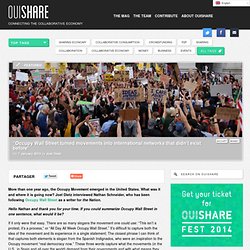
What was it and where it is going now? Joel Dietz interviewed Nathan Schneider, who has been following Occupy Wall Street as a writer for the Nation. Hello Nathan and thank you for your time. If you could summarize Occupy Wall Street in one sentence, what would it be? If it only were that easy. Besides dissatisfaction, is there any other common sentiment that is shared by Occupy Wall Street participants? Actually, I tended to find that there was a lot more optimism during the occupations themselves than frustration. There was a huge emphasis on transparency, individual autonomy, responsibility and fostering a culture in which both resources and ideas are available to all. So what the fuck has occupy done so far? America’s last hope: A strong labor movement. The fate of the labor movement is the fate of American democracy.
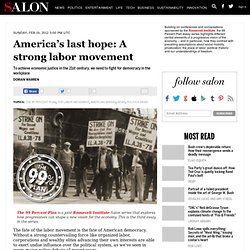
Without a strong countervailing force like organized labor, corporations and wealthy elites advancing their own interests are able to exert undue influence over the political system, as we’ve seen in every major policy debate of recent years. Yet the American labor movement is in crisis and is the weakest it’s been in 100 years. That truism has been a progressive mantra since the Clinton administration.
However, union density has continued to decline from roughly 16 percent in 1995 to 11.8 percent of all workers and just 6.9 percent of workers in the private sector. Occupy Un-Occupies Its Own Strike Campaign - National. The next major action planned by Occupy Wall Street is a nationwide general strike set for May 1, and to promote it they've started producing a lot of great-looking works of propaganda that largely downplays the involvement of Occupy itself.

The videos, posters, and paintings promoting the strike that actually mention Occupy tend to place it in the background rather than as the central component. Organizers say they're aiming a much larger audience than the folks who camped or protested in city squares last fall. "A general strike really needs to be general," organizer Joe Sharkey said. "May Day is a traditional day for workers movements and revolution, so I think that’s the main emphasis. It’s to broaden the appeal and not just attach it to Occupy. Rock poster artist R. Michael Caigoy, a film writer at the Buffalo Beast, kept the focus on history with a poster quoting 1960s-era Berkeley free speech activist Mario Savio, which should certainly appeal to activists of a certain age:
King says UAW prepping for nationwide protests. 6 Ways to Get Ready for the May 1st GENERAL STRIKE. Yesterday, 60,000 marched on Madison to mark the one-year anniversary of the passage of Governor Scott Walker's drastic dismantling of collective bargaining rights for public employees.
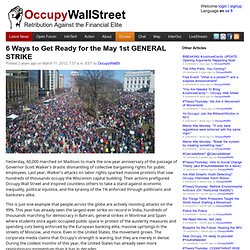
Last year, Walker's attacks on labor rights sparked massive protests that saw hundreds of thousands occupy the Wisconsin capital building. Their actions prefigured Occupy Wall Street and inspired countless others to take a stand against economic inequality, political injustice, and the tyranny of the 1% enforced through politicians and banksters alike. This is just one example that people across the globe are actively resisting attacks on the 99%. This winter, we refocused our energies on fostering ties with local communities, saving homes from corrupt banks and jobs from greedy corporations, and building and expanding our horizontal infrastructure. This #GlobalSpring, we will take the streets again. We are getting ready. Civic Action. Ahead of May Day, David Harvey Details Urban Uprisings from Occupy Wall Street to the Paris Commune.
This is a rush transcript.
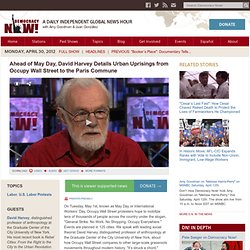
Copy may not be in its final form. AMY GOODMAN: Tuesday is May Day, May 1st, also known as International Workers’ Day, a holiday that celebrates workers’ rights and achievements of organized labor, such as the eight-hour workday. The Occupy Movement: Rising Anarchy. April 03, 2012 By: Ian Oxnevad. Crushing Dissent - The Smearing of Wikileaks and Occupy. Close your eyes for a moment and imagine the worst possible future abuse by a government over its own citizens. The first thing likely to come to mind for many would be assassination of citizens without due process. Sadly, you will have to think a bit harder; in the US, which so often describes itself as the world's leading democracy and regularly criticizes the human rights records of other nations, the right to kill its own citizens before allowing them a chance to give their side of the story has already been reserved.
Targets are placed on a 'kill list' by a secret panel working out of the White House, and their findings are brought to the President, who makes the final decision on whether a suspect will live or die. And not just the suspect, anyone else unfortunate enough to be standing close by when the drone strikes. Imagine if citizens, sufficiently outraged, took to the streets and blogs to protest. Wither Wall Street: Challenge of the Occupy Movement. Over the last three months New York City has been electrified by the Occupy Wall Street movement. Prachi Patankar and I have been participating in some of the actions. How I Stopped Worrying and Learned to Love the OWS Protests.
Occupy Wall Street's anarchist roots. New York, NY - Almost every time I'm interviewed by a mainstream journalist about Occupy Wall Street I get some variation of the same lecture: "How are you going to get anywhere if you refuse to create a leadership structure or make a practical list of demands? And what's with all this anarchist nonsense - the consensus, the sparkly fingers? Don't you realise all this radical language is going to alienate people? You're never going to be able to reach regular, mainstream Americans with this sort of thing! " If one were compiling a scrapbook of worst advice ever given, this sort of thing might well merit an honourable place.
I should be clear here what I mean by "anarchist principles". Anarchism versus Marxism. The Vacancies of Capitalism. Throughout the first several weeks of Occupy Oakland’s existence the analysis and discussion at the General Assembly and elsewhere has been about the need to construct an entirely different social order. It is not so much that “the system is broken” but that it is, and always has been, set up to deliberately benefit, a small minority. The few social provisions that allowed many people in Oakland to survive off of low or no wages have been cut, largely to maintain a police budget that consumes 2/3rds of the city budget. Budget cuts to education and services, police brutality, unemployment and housing foreclosures all serve to multiply the pain and precariousness of a growing number of Oaklanders, displacing many more, including 25% of Oakland’s black population in the last 10 years.
The Corporate State Will Be Broken. I spent Friday morning sitting on a wooden bench in a fourth-floor courtroom in the New York Criminal Court in Manhattan. I was waiting to be sentenced for “disturbing the peace” and “refusing to obey a lawful order” during an Occupy demonstration in front of Goldman Sachs in November. VersoBooks.com. Fear of a Slacker Revolution. Generation Occupy: The Demands May Not Be Televised, But Can They Still Be Heard? « Protest Camps. We live in an age where it is socially acceptable, if not encouraged, to camp out overnight for the opportunity to hand over $500 for the latest piece of mass produced technology. Pictures of technophiles and devotees ecstatically clutching the latest piece of electronics, many brandishing them over their head like they have just defeated Manny Pacquiao and received the Welterweight World Champion belt, are common place.
Can Occupy survive its representation? On the Verge of Chaos. The revolution begins at home. Why Occupy Wall Street is Not the Tea Party of the Left. Intellectual Roots of Wall Street Protest Lie in Academe - Faculty. By Dan Berrett Academics have become frequent visitors to Zuccotti Park, the 33,000-square-foot pedestrian plaza in the heart of New York City's financial district that is now the site of a nearly monthlong protest, Occupy Wall Street. Famous scholars like Cornel West, Slavoj Zizek, and Frances Fox Piven have spoken to the crowd, with their remarks dispersed, word-for-word, from one cluster of people to the next through a "human megaphone. " Many others, such as Lawrence Lessig, have lent their support from farther away, as the demonstrations have spread to cities and college campuses nationwide. The movement has repeatedly been described as too diffuse and decentralized to accomplish real change, and some observers have seen the appearances by academic luminaries as an attempt to lend the protest intellectual heft and direction.
Certainly, its intellectual underpinnings and signature method of operating are easier to identify than its goals. Three days after the protests began, Mr. HOT SPOTS - OCCUPY, ANTHROPOLOGY, AND THE 2011 GLOBAL UPRISINGS. Robert Reich: Occupiers Occupied: The Hijacking of the First Amendment. A funny thing happened to the First Amendment on its way to the public forum. According to the Supreme Court, money is now speech and corporations are now people. Theory & Event - Occupy Wall Street: Return of a Repressed Res-Publica. Cultural Outcomes of the Occupy Movement. The World Tomorrow: Noam Chomsky and Tariq Ali. Noam Chomsky Speaks On Occupy Wall Street Protests. Noam Chomsky's Thoughts on Occupy Wall Street. Naomi Klein @ Occupy Wall Street 10-06-2011.
Occupy Everywhere: Michael Moore, Naomi Klein on Next Steps for the Movement Against Corporate Power. "Occupy Everywhere": May Day Special Show on OWS, Immigration, Labor Protests. 1 of 3. Global Solidarity and the Occupy Movement. The Resurgence of the Civic. Chris Hedges in Times Square. Council of Elders express solidarity with Occupy Wall Street. Occupy Wall St. vs Tea party with Henry James Ferry. Grounded News video report 5. OWS: Bill Maher w/ Bill Moyers on importance of popular support and Occupy movement. Occupy America / #OccupyAmerica. A Vision of Post-Clicktivist Activism.
#OCCUPYWALLSTREET. Declaration of the Occupation of New York City. Where Does Occupy Wall Street Go From Here? We Are the 99 Percent. Search - #IOccupyBecause. Working America. The Battle for the Soul of Occupy Wall Street. From Occupy Wall Street to Occupy Everywhere. Occupied Wall Street Journal, PDF. GAZETTE-2.pdf (application/pdf Object) The Other 98% - Politics for the rest of us. Page 1 of 18. Tidal: occupy theory, occupy strategy. Tidal#3.pdf. OCCUPIED STUDIES. Occupy-Pamphlet-Final-1mv67zb.pdf (application/pdf Object)
Occupy Wall Street. OCCUPY LOVE (2013) - Official Trailer. Lessons In Extreme Collaboration From Occupy Wall Street And "99%"